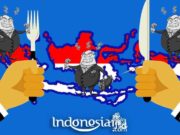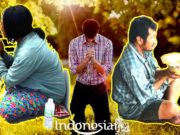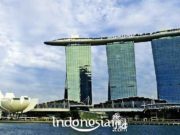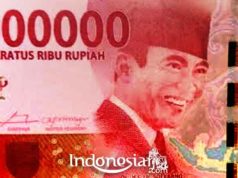The tiwah ceremony is a ritual performed by the Dayak Tribe which aims to take the spirit to its place of origin (lewu tatau) with Ranying, the highest god in Kaharingan belief.
The ceremony begins with the construction of a house-shaped building called Balai Pangun Jandau, which is to build a hall in just one day. The requirements that must be met are a pig that Bakas Tiwah must kill himself.
After Balai Pangun Jandau was completed, Bakas Tiwah conducted the Sababulu Market, which was to give signs for the items to be used for Tiwah ceremonies later and provide Dawen Silar which would later be used for Palas Bukit.
After completing the initial process, the process was continued by establishing Sangkaraya Sandung Rahung which was placed in front of Bakas Tiwah’s house, which was used to store the bones of each pile of liau.
After that, a pig was killed and its blood was drawn to avenge Sangkaraya Sandung Rahung. Around Sangkaraya Sandung Rahung, yellow bamboo and lamiang or Tamiang Palingkau are installed, as well as yellow cloths and the Panjang Ngambang Kabanteran Bulan flag, Rarusir Ambu Ngekah, Lampung Matanandau.
While preparing all the musical instruments, sounds such as gandang, hanging, kangkanung, toroi, katambung and tarai. But first, all the musical instruments, as well as all the tools to be used, must go through a separate ritual process, in the Tiwah ceremony they are slacked or poked with the blood of a determined animal.
Penawur began to carry out their task of menawur to contact the pile of liau who would be involved in the Tiwah ceremony to know and ask permission from the Sangiang, Jata, Naga Galang Petak, Nyaring, Pampahilep Also notification was given to Sangumang, Sangkanak, Jin, Kambe Hai, Bintang, Bulan, Patendu, Jakarang Matanandau.
After that, the preparation was continued with the preparation of sacrificial animals that had been prepared, such as pigs, cows or buffalo tied to the Sangkaraya poles. Then the Manganjan dance was held which began with three people circling around Sangkaraya. All the sounds at that time were beaten, screams of joy were heard here and there, the atmosphere was blissfully cheerful.
In this tradition, the use of brown rice and yellow rice is sprinkled upwards. After Menganjan is finished, start the animal killing event. The blood of slain animals is collected on a bench and will be used to wash away all the dirt. It is believed that the blood of the animal sacrificed was the blood of Rawing Tempun Telun, which Hatalla had purified.
All the preparations for the process were prepared, so the pile of liau was also present and actively participated in the Tiwah celebration but its presence was not visible to the physical eye.
The pile of liau became happier and happier when the families, including fathers, mothers, children, uncles, aunts, grandparents gathered there, and met those who were present at the celebration.
They rubbed turmeric water on the palms of the hands and feet of those present, poured coconut oil on the heads of the guests, poured baram and anding and offered sticky rice, rice, chicken feet, and lard which ended with serving cigarettes and sipa.
In the Hindu Kaharingan belief, the Tiwah ritual is usually guided by a “Basir” who is often called “Basir Duhung Handepang Telun”, who is a spiritual leader who performs the tiwah ceremony with Basir Upu, Basir Panggapit and Basir Pendamping.
At the time he performed the ceremony as a hanteran man wearing great clothes such as the King of Pampulau Hawun, Randin Talampe Batanduk Tunggal when he performed Tiwah Suntu at Batu Nindang Tarung Kereng Angker Angker Batilung Nyaring.
There are two tasks that must be carried out by a Basir or Pisor, namely, first, guide and guide people in the religious field. In relation to community development, Basir Duhung Handepang Telun is also the Hindu Kaharingan cleric.
He is obliged to provide guidance in the various systems of life to people who come to ask for instructions on choosing a good day for carrying out religious ceremonies.
And secondly, the servants of the people in carrying out religious ceremonies, namely Basir Duhung Handepan Telun, have a very heavy duty in carrying out Tiwah religious rituals.
He served as a Liau manner, rice manager, and guided the widowers and widows of Kanjan Pahi. The tiwah ceremony ritual is a very special local wisdom for the community and can attract tourists to witness the implementation of the tiwah ritual itself.
However, there is something to note that when tourists attend the tiwah ceremony itself, there are a number of taboos when watching the tiwah ceremony. Namely, there are vegetables, types of fish, and types of animals that are not allowed to be brought to the location of the ceremony. If this rule is violated, the offender will be sanctioned by the custom of tiwah.
So, this tiwah ceremony is a legacy of indigenous Indonesian local wisdom that needs to be preserved. Come on, get other interesting information from Indonesiar.com and visit Indonesia.






























